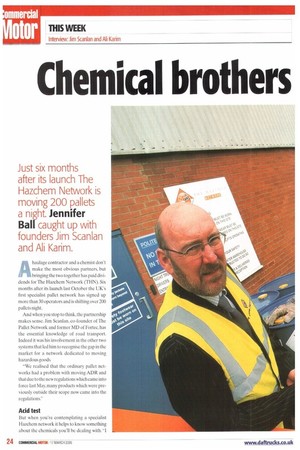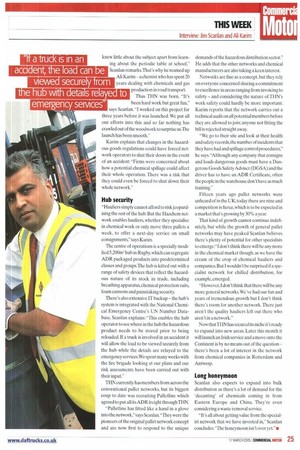Chemical brothers
Page 24

Page 25

If you've noticed an error in this article please click here to report it so we can fix it.
Just six months after its launch The Hazchenn Network is moving 200 pallets a night. Jennifer
Bali caught up with
founders Jim Scanlan
and Ali Karim.
haulage age contractor and a chemist don't
make the most obvious partners, but bringing the two together has paid dividends for The Hazchem Network (THN). Six months after its launch last October the UK's first specialist pallet network has signed up more than 30 operators and is shifting over 200 pallets night.
And when you stop to think, the partnership makes sense. Jim Scanlan, co-founder of The Pallet Network and former MD of Fortec, has the essential knowledge of road transport. indeed it was his involvement in the other two systems that led him to recognise the gap in the market for a network dedicated to moving hazardous goods.
"We realised that the ordinary pallet networks had a problem with moving ADR and that due to the new regulations which came into force last May, many products which were previously outside their scope now came into the regulations."
Acid test
But when you're contemplating a specialist Hazchem network it helps to know something about the chemicals you'll be dealing with. "I
knew little about the subject apart from learning about the periodic table at school," Scanlan remarks. That's why he teamed up Ali Karim— a chemist who has spent 20 years dealing with chemicals and gas production in road transport.
Thus THN was born. -It's been hard work but great fun," says Scanlan. "I worked on this project for three years before it was launched. We put all our efforts into this and so far nothing has crawled out of the woodwork to surprise us.The launch has been smooth."
Karim explains that changes in the hazardous goods regulations could have forced network operators to shut their doors in the event of an accident: "Firms were concerned about how a potential chemical spillage could affect their whole operation. There was a risk that they could even be forced to shut down their whole network."
Hub security
"Hauliers simply cannot afford to risk jeopardising the rest of the hub. But the Hazchem network enables hauliers, whether they specialise in chemical work or only move three pallets a week, to offer a next-day service on small consignments," says Karim.
The centre of operations is a specially modified 5,200m2 hub in Rugby, which can segregate ADR packaged products into predetermined classes and groups. The hub is kitted out with a range of safety devices that reflect the hazardous nature of its stock in trade, including breathing apparatus, chemical protection suits, foam cannons and painstaking security.
There's also extensive IT backup — the hub's system is integrated with the National Chemical Emergency Centre's UN Number Database. Scanlan explains: "This enables the hub operator to see where in the hub the hazardous product needs to be stored prior to being reloaded. If a truck is involved in an accident it will allow the load to be viewed securely from the hub while the details are relayed to the emergency services. We spent many weeks with the fire brigade looking at our plans and our risk assessments have been carried out with their input."
THN currently has members from across the conventional pallet networks, but its biggest coup to date was recruiting Palletline which agreed to put all its ADR freight throughTHN.
"Palletline has fitted like a hand in a glove into the networlesays Scanlan."They were the pioneers of the original pallet network concept and are now first to respond to the unique demands of the hazardous distribution sector." He adds that the other networks and chemical manufacturers are also taking a keen interest.
Networks are fine as a concept, but they rely on everyone concerned sharing a commitment to excellence in areas ranging from invoicing to safety — and considering the nature of THN's work safety could hardly be more important. Karim reports that the network carries out a technical audit on all potential members before they are allowed to join; anyone not fitting the bill is rejected straight away.
"We go to their site and look at their health and safety records, the number of incidents that they have had and spillage control procedures," he says. "Although any company that consigns and loads dangerous goods must have a Dangerous Goods Safety Adviser (DGSA) and the driver has to have an ADR Certificate, often the people in the warehouse don't have as much training."
Fifteen years ago pallet networks were unheard of in the UK; today there are nine and competition is fierce, which is to be expected in a market that's growing by 30% a year.
That kind of growth cannot continue indefinitely, but while the growth of general pallet networks may have peaked Scanlan believes there's plenty of potential for other specialists to emerge:"I don't think there will be any more in the chemical market though, as we have the cream of the crop of chemical hauliers and companies. But I wouldn't be surprised if a specialist network for chilled distribution, for example, emerged.
"However, I don't think that there will be any more general networks. We've had our fun and years of tremendous growth but I don't think there's room for another network. There just aren't the quality hauliers left out there who aren't in a network."
Now thatTHN has secured its niche it's ready to expand into new areas. Later this month it will launch an Irish service and a move onto the Continent is by no means out of the question — there's been a lot of interest in the network from chemical companies in Rotterdam and Antwerp.
Long honeymoon
Scanlan also expects to expand into bulk distribution as there's a lot of demand for the 'decanting' of chemicals coming in from Eastern Europe and China. They're even considering a waste removal service.
"It's all about getting value from the specialist network that we have invested in," Scanlan concludes. "The honeymoon isn't over yet." •










































































































































































































